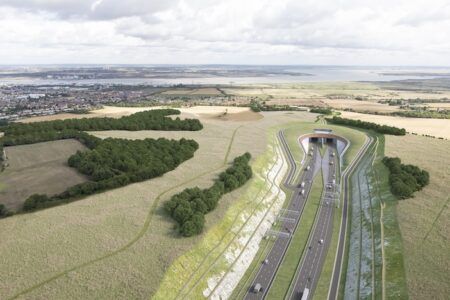A partnership between Qualcomm Technologies Inc, Renault, and Vedecom has successfully demonstrated dynamic electric vehicle charging (DEVC), with a charge of up to 20Kw at speeds up to, and in excess of, 62mph (100km/h).
As the ‘electrification’ of the world’s vehicle fleet continues to accelerate, a major hurdle has been the range limitation of current electric vehicles (EV), with a system that allows them to recharge while driving seen as a long-term goal. Based on its Halo wireless electric vehicle charging technology (WEVC), Qualcomm Technologies has designed and built a wireless DEVC system capable of charging an EV at highway speeds. Together with its project partners, auto maker Renault, and the French Vedecom R&D institute, semiconductor and electronics developer Qualcomm has demonstrated dynamic charging, as well as simultaneous charging, in which two vehicles on the same track can charge at the same time, in either direction.
The dynamic charging demonstrations took place at the 328ft (100m)-long test track, which has been built by Vedecom at Satory Versailles in France, as part of the European FABRIC project. Qualcomm and Vedecom integrated the transmission source part of the Halo DEVC system in the test track, while Vedecom and Renault integrated the receiving part onto two Kangoo vehicles. Following the demonstration, the Halo DEVC system will be handed over to Vedecom to perform tests for FABRIC; a 9m (US$10m) project, mostly funded by the European Commission (EC). The tests will evaluate the operation, safety and efficiency of energy transfer to the vehicles for a wide range of practical scenarios, including: vehicle identification and authorization on entering track; power level agreement between track and vehicle; and speed and alignment of vehicle along track.
FABRIC is addressing the technological feasibility, economic viability, and socio-environmental sustainability of wireless DEVC as a means of EV range extension. The project began in January 2014 and will continue through December 2017, and is being undertaken by a consortium of 25 organizations from nine European countries, including auto makers, suppliers, service providers and research organizations from automotive, road and energy infrastructure domains.
Steve Pazol, VP and general manager of wireless charging at Qualcomm, commented, “The combination of a global team of expert engineers and our Halo technology, which covers all aspects of WEVC systems, irrespective of the magnetics used, has enabled us to really push the boundaries of the possible, and outline our vision for future urban mobility.”




